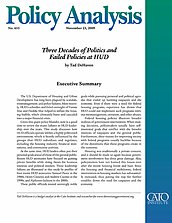The U.S. Department of Housing and Urban Development has long been plagued by scandals, mismanagement, and policy failures. Most recently, HUD’s subsidies and failed oversight of Fannie Mae and Freddie Mac helped to inflate the housing bubble, which ultimately burst and cascaded into a major financial crisis.
Given this giant policy blunder, now is a good time to review the many failures in HUD leadership over the years. This study discusses how HUD officials operate within a highly politicized environment, which is heavily influenced by the groups that HUD subsidizes and regulates, including the housing industry, financial institutions, and community activists.
At the same time, HUD leaders often put their personal goals ahead of those of the general public. Recent HUD secretaries have focused on gaining private benefits while doing favors for business interests and political insiders. These leadership failures are illustrated in this study by profiles of four recent HUD secretaries: Samuel Pierce in the 1980s, Henry Cisneros and Andrew Cuomo in the 1990s, and Alphonso Jackson in the 2000s.
These public officials touted seemingly noble goals while pursuing personal and political agendas that ended up harming taxpayers and the economy. Even if there were a need for federal housing programs, experience has shown that HUD could not implement such programs without mismanagement, cronyism, and other abuses.
Federal housing policies illustrate broader realities of government intervention. When making decisions, policymakers usually have selfinterested goals that conflict with the broader interests of taxpayers and the general public. Furthermore, their visions for improving society with federal programs usually backfire because of the distortions that those programs create in the economy.
Housing was traditionally a private concern, and it should be made so again because government involvement has done great damage. Alas, policymakers have not learned this lesson even after the recent housing boom and bust. Since the housing and financial meltdowns, federal intervention in housing markets has substantially increased, thus paving the way for further troubles down the road for taxpayers and the economy.

This work is licensed under a Creative Commons Attribution-NonCommercial-ShareAlike 4.0 International License.

